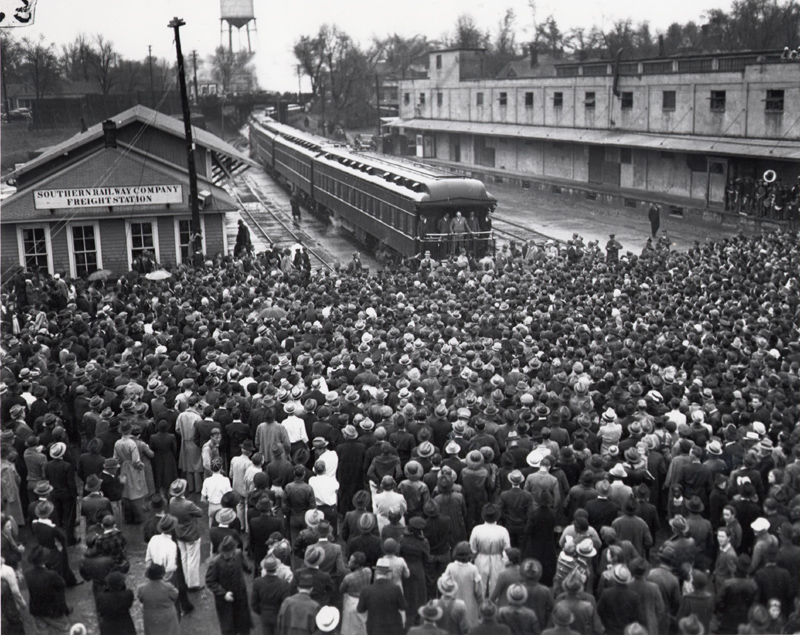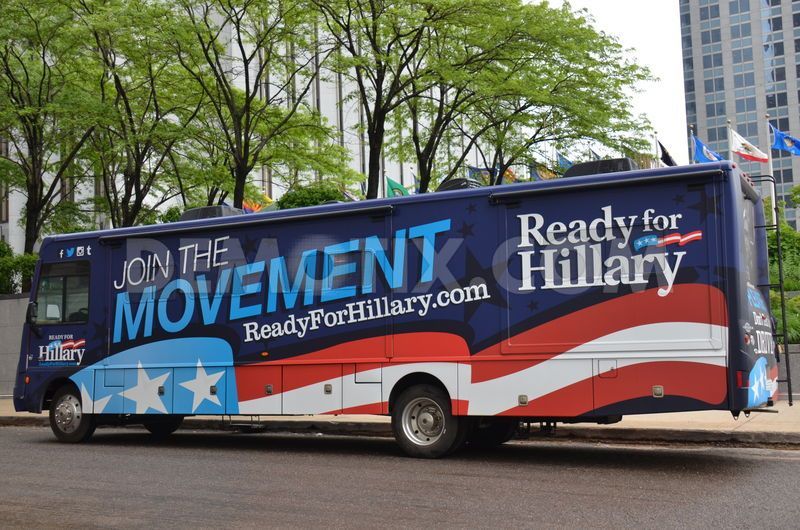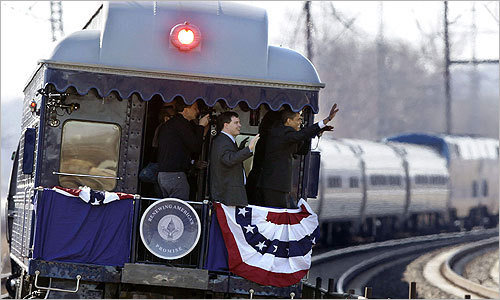General Discussion
Related: Editorials & Other Articles, Issue Forums, Alliance Forums, Region ForumsWhy Overall Impressions of a Campaign Are More Important than Details
Campaigns, especially for the presidency, aren't really about policy and planning for what the candidate will do if elected. Here on DU, we dissect speeches and notice what was said and what was omitted. We're decidedly not representative of how most voters behave. When most voters bother to watch a politician give a speech, a day later they don't remember exactly what was said or what wasn't. What do they remember?
They remember the reaction of the crowd and their own general reaction to the candidate. What frustrates us as political wonks doesn't even get a thought from most people. In fact, most voters never listen to any speeches by candidates. Instead, they get snippets from those speeches in 15-second chunks on the evening news. In those cases, the crowd reaction has more of an impact than anything the candidate says. It's the bandwagon effect.
Candidates who win elections understand this, and so do their advisers, speechwriters and managers. Speeches are designed to get strong applause or even cheers from the audience that is there at the time. That's what the TV news will show. That's what voters remember throughout the campaign. Elections rarely turn on the thoughtfulness and completeness of what the candidates say. They turn on the reaction. That's what is remembered.
Is that how it should be? Well, no. In an ideal election and campaign period, people would be sitting on the edge of their seats to hear exactly what candidates have in mind for their term in office. They'd be looking for details and concrete policy proposals. That's not how it goes, though. Instead, on the infrequent occasions when people bother to listen at all, they're listening for promises that sound good. They're listening for hints of solutions for anything that concerns them. They want to believe, not understand.
The 2016 election will be the same as all the other elections. The candidate who wins won't be the one with the most detailed presentation of policy plans. As always, it will be the candidate who gets the biggest positive emotional reaction by the most people. So it goes. Barack Obama understood that better than almost anyone we've elected. If we expect people to behave differently than they have in the past, we will be disappointed. Vague promises about the top five concerns of most people win elections. The rest is forgotten, except by people who follow politics on a daily basis. Those close followers are a tiny minority of voters and don't really matter much in determining the winner. Sad, but true.
BumRushDaShow
(129,017 posts)and this has been the case for some time - and moreso during the radio, television, and now internet eras that offered a broader reach without actually "being there". The message had to be given in terms of maximum impact for the short periods allotted to reach the target audiences - notably during the times when you literally "were there" (like FDR on this whistlestop) and had to move on -

MineralMan
(146,311 posts)Today, Major Network and Local TV News takes its place. Candidates still travel to as many states as they think they have a chance of winning. Wherever they stop in those states, local news throughout the state covers the visit. So, they go mainly to big cities, where campaign donors are more likely to live. They do a public event, and that event is broadcast statewide on every local news program in the state. Residents see those brief reports and feel almost like they were visited.
In caucus states, of course, local visits are important for primary candidates, but relatively few people are actually in attendance. Again, local news outlets cover those visits, letting people skip them, while noticing that the candidate took the time to come to their state. Impressions are made by the candidates and then reinforced in TV advertising. That's campaigning today, especially for presidential candidates. National appearances, like debates and major press conferences are the rest of the deal.
BumRushDaShow
(129,017 posts)

along with some symbolic train stops...

And CSPAN's "Road to the White House" does some interesting coverage of these trips and the evening soirées that often occur with them.
The bus lets them get to the "town hall" style meetings and show the will to go beyond campaigning "virtually" (via TV or internet). It's a rolling advertisement in essence.
There are certain demographics who don't own or wish to own a TV (let alone internet) or if they do, they are in areas that are so rural that they have difficulty even with satellite availability and/or reception. When you travel by bus (or even car) through a rural area (I recall my taking a Greyhound from Cincinnati to Indianapolis), you really do get a feel for an area and why people may be the way they are.
jeff47
(26,549 posts)That way we can be disappointed just like everyone else when the candidate doesn't live up to the dreams we plastered onto them.
MineralMan
(146,311 posts)They will be, and some people will actually pay attention. The candidates, though, will take and answer those questions when they want to, not when you want them to. Yesterday's campaign launch speech was a good example. It was not about answers to questions. It was about making an initial impression. Expecting it to be anything else is going to be disappointing. The speech lasted for 45 minutes, and hit a fairly large number of issues. Those issues were carefully chosen, based on research. TPP, for example, wasn't mentioned. The reason is that only a small minority of people even know what it is or what the issues about it are.
Campaign speeches are not about details. Policy papers are about that. Those will appear. New topics will appear in campaign speeches. Not on your schedule or mine, though. They will appear on the candidate's schedule. That's true for every candidate.
jeff47
(26,549 posts)The entire point of your OP is an attempt to deflect from getting details from candidates. Because your OP argues that details are completely irrelevant to campaigns. So campaigns are not going to produce those details.
The reason so many are disappointed about Obama and the Democratic party in general is they never got details. So they projected their own details onto the candidate. Obviously, that isn't going to be accurate, and will produce disappointment.
So when Clinton calls for "a living wage" but fails to say what that is or how it would be determined, some people are going to project $15/hr onto her. Some will project something more modest, like $10-11/hr. And all of them will be disappointed. Because without hard details, we won't fight against Republican theoretical framework. We'll just sit there and smugly say "it's obvious", because of course the candidate agrees with my number.
And we get nothing, or a token that doesn't actually solve the problem. Leading to the next battle being much more difficult, because "it did not work last time".
It's like the centrists are forever locked in 1992. Or 1972. It doesn't occur to them that we can do something different.
MineralMan
(146,311 posts)The details will appear, but not in campaign speeches, which is what I was addressing. Will Clinton call for a $15 minimum wage? I do not know. What a living wage is differs in different markets, actually. In Smalltown, Missouri, it is lower than in any major city. I can show you places in the US where you can buy a decent small home for around $40K. I can also show you places where the same home will cost you ten times as much. You can find an apartment for rent in some markets for $300/month. In other markets, you'll have to pay ten times as much. A living wage means different things in different places. In low cost of living markets, $15 is, indeed, a living wage. In more costly market, it would still keep you in poverty.
Details. Details matter, but you're not going to get any you can depend on in a campaign speech. And if you do, there is no assurance that a presidential candidate will be able to implement such a thing anyhow. Direction and focus is what campaign speeches are about, not detailed programs in most cases. I'll give you a great example:
Barack Obama said that he would shut down Guantanamo in his 2008 campaign. Now, in 2015, it's still open. Why? Because the office of President can't shut Guantanamo down, and he could get a hostile Congress to go along. Obama didn't say he'd help make marriage equality happen during his time in office during the 2008 campaign. We're going to get that, though, and very soon. Detailed campaign promises are iffy, at best.
I didn't say not to ask questions anywhere in my OP. I said not to expect answers in campaign speeches. Answers to policy questions come in other ways and other venues. You'll hear some during debates. You'll find some on candidates' websites. You'll get others in one-on-one press interviews. The questions will be asked and answers given. Campaign speeches are for stirring up support from people who will never go looking for those answers.
I didn't post a DU poll about who listened to Clinton's campaign launch speech. Why? Because the results would have been really, really depressing. I don't do that any more.
sufrommich
(22,871 posts)in every country that has elections.
MineralMan
(146,311 posts)Heck, it's frustrating for me, too. But that's not who campaigns are targeting. They'll issue policy statements for wonks to pore over.
Right now, Hillary's working on her general constituency and hitting the issues that concern them. So is Bernie Sanders. He knows that he gets the most enthusiasm when he speaks about economic issues from the people who are supporting him. So that's what he's focusing on. He knows that he has to do very well in early primary states, so he's building support there among people who think economic issues are most important.
Every campaign seeks out and reinforces its own constituency. That's especially true in primary races, where low turnouts make it possible for any candidate to pull a higher percentage of votes than in a general election. In caucus states, the pool is even smaller. That's why everyone is in Iowa today, pressing the flesh as fast as possible.
leftofcool
(19,460 posts)cali
(114,904 posts)though clearly Bernie Sanders is resonating with voters in part because he is being specific about policy.
Oh, and that you think policy proposals are details, sums up your view, perfectly.
Well, at least you like HRC now and think she's smart enough to be President.
MineralMan
(146,311 posts)Last edited Sun Jun 14, 2015, 12:59 PM - Edit history (1)
except for Lincoln Chafee, would do a good job as President. I like Bernie Sanders best, but, like you, I don't expect him to get the nomination. Also like you, I will vote for Hillary Clinton if she is the nominee. Policy proposals are details. I don't expect to hear them in campaign speeches very often, for the reasons I mentioned in my OP.
In 2008, I supported Barack Obama and thought that Hillary Clinton said and did some really stupid things. She appears to have learned, though, and there's no Barack Obama in contention in 2016. In 2006, I wouldn't have given Obama any chance of becoming President, and thought he was an idiot for trying. I was wrong. I figured that out late in 2007. I had underestimated his ability to fire up a broad range of supporters. This year, I support Bernie Sanders in the primaries. In my mind , though, I expect to be voting for Hillary in November of 2016, just like you do.
Making policies work is dependent on more than just the President. It's important for policy wonks to know what each candidate proposes to do and how. Most voters pay little attention to that, though. That's the point of my OP, and is why we're often disappointed in campaign speeches, especially early in a campaign.
MineralMan
(146,311 posts)I absolutely must get my yard mowed and cleaned up. We're between rainstorms today. If I wait, it'll be much harder.
whatchamacallit
(15,558 posts)for the status quo.
MineralMan
(146,311 posts)and kick my thread.
whatchamacallit
(15,558 posts)MineralMan
(146,311 posts)Jim Lane
(11,175 posts)Details will have an important effect on that overall impression if a campaign, with the complicity of the corporate media, can propagate some smear of a candidate. The Willie Horton ad about Michael Dukakis is a classic example. Some voters who knew virtually nothing else about Dukakis would have told you that he furloughed a murderer.
MineralMan
(146,311 posts)their plans, though. Negative campaigning really annoys me.